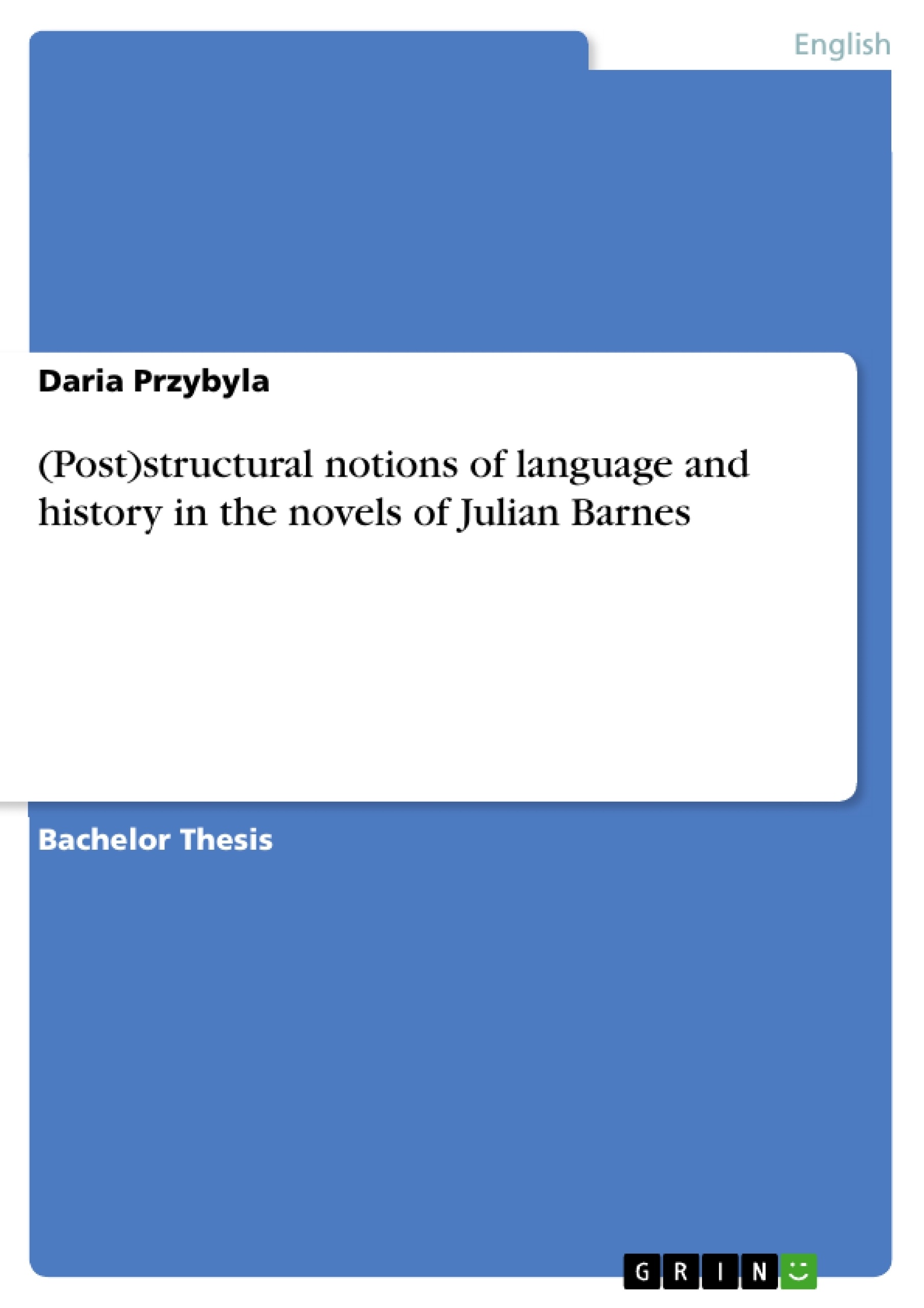In my thesis I elaborate on the literary creativity of Julian Barnes. My paper consists of two chapters entitled Language as Identity and Difference and History in Time and Space. The predominating part of each chapter is devoted to the position of individuals competing with meta-narratives of language, history, politics, religion, and culture. The ultimate outcome of the protagonists’ proceedings is ambivalent in the sense that their efforts are successful only to some extent. However, at the same time, I illustrate that by opposing domination the protagonists manage to undermine the assumed rationale of social discourses and revise the long-established hierarchies of western values. In the first chapter, we have to do with a broad spectrum of ambiguities connected with the usage of language. Barnes’s representation of linguistic reality comprises elements of both structural and poststructural linguistics. The author’s analysis is based on the writings of many different philosophers and linguists such as: Wolfgang Iser, Ferdinand de Saussure, Mikhail Bakhtin, Roland Barthes, Jacques Derrida and Ludwig Wittgenstein. The subsequent part of the same chapter is devoted to the problem of fragmented narration- mainly with respect to Flaubert’s Parrot. In the second chapter, I elaborate on the status of history in Barnes’s novels. It is focused on the interrelations between history and society as well as history and individuals. This sort of research profile leads to posing further questions about the master-narratives that encapsulate the image of God and the vision of the whole world- in temporal and spatial terms. This interpretation is performed with the help of some French philosophers like Michel Foucault and Jean Baudrillard. The theoretical account of the linguistic and historical aspects of discourse, as they are presented by Barnes, allows me to describe the author as a left-wing one who rejects formal knowledge that circulates via social and political institutions. The scrutiny of Barnes’s texts is the main point of departure to more general questions connected with contemporary literary theory and cultural studies.
Inhaltsverzeichnis (Table of Contents)
- Introduction
- CHAPTER ONE Language as Identity and Difference
- CHAPTER TWO History in Time and Space
- Conclusion
Zielsetzung und Themenschwerpunkte (Objectives and Key Themes)
This thesis examines the (post)structural notions of language and history in the novels of Julian Barnes. The analysis focuses on four of his novels: Metroland, Flaubert's Parrot, A History of the World in 10 ½ Chapters, and Cross Channel. The thesis aims to explore the ways in which Barnes utilizes these concepts to critique social structures, explore the nature of identity, and question the validity of historical narratives.
- The construction of meaning in language and the impact of language on identity.
- The role of history in shaping individual and collective identity.
- The interplay between personal and historical narratives.
- The deconstruction of master-narratives in culture and society.
- The relationship between language and power dynamics.
Zusammenfassung der Kapitel (Chapter Summaries)
Chapter One: Language as Identity and Difference
This chapter examines the role of language in shaping individual and collective identity in Barnes's novels. It analyzes the interplay between spoken language, linguistic theory, and the construction of meaning. The chapter draws on theories from Derrida, Lacan, Wittgenstein, Kristeva, and de Saussure, among others, to explore the ways in which language both defines and limits our understanding of ourselves and the world around us.
Chapter Two: History in Time and Space
This chapter explores Barnes's treatment of history in his novels, focusing on the concept of master-narrative and the ways in which historical narratives are often constructed to serve specific political or ideological agendas. The chapter analyzes Barnes's deconstruction of traditional historical accounts and his emphasis on the importance of individual perspectives and experiences. It also examines the role of Christian history and the tension between the sacred and the profane in Barnes's works.
Schlüsselwörter (Keywords)
Key terms and concepts explored in this thesis include: (post)structuralism, language, identity, history, master-narrative, deconstruction, social domination, ideology, literary theory, cultural studies, French criticism, New Left, Michel Foucault, Jürgen Habermas, Derrida, Lacan, Wittgenstein, Kristeva, de Saussure, Iser, and Barnes's novels: Metroland, Flaubert's Parrot, A History of the World in 10 ½ Chapters, and Cross Channel.
Frequently Asked Questions
What is the central theme of the thesis on Julian Barnes?
The thesis explores (post)structural notions of language and history in Julian Barnes's novels, focusing on how individuals compete with meta-narratives.
Which novels of Julian Barnes are analyzed?
The analysis focuses on "Metroland", "Flaubert's Parrot", "A History of the World in 10 ½ Chapters", and "Cross Channel".
How does Barnes treat the concept of history?
Barnes deconstructs traditional historical accounts, emphasizing individual perspectives and questioning the "master-narratives" used by political institutions.
Which philosophers influence this literary analysis?
The study draws on thinkers like Michel Foucault, Roland Barthes, Jacques Derrida, Ludwig Wittgenstein, and Jean Baudrillard.
What is "Language as Identity and Difference" in this context?
It refers to how language defines and limits individual identity, using both structural and poststructural linguistic elements in Barnes's prose.
- Citation du texte
- Master of Arts Daria Przybyla (Auteur), 2005, (Post)structural notions of language and history in the novels of Julian Barnes, Munich, GRIN Verlag, https://www.grin.com/document/77070



